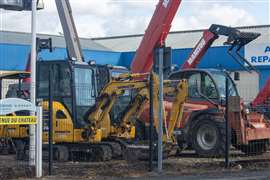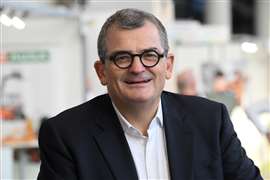Interview: How French rental association DLR is tackling machine theft
13 December 2024
 Photo: Henry Saint John via AdobeStock
Photo: Henry Saint John via AdobeStock
Theft of rental equipment remains a persistent and costly challenge for the industry around the world.
With valuable machinery often stored on unsecured job sites or transported between locations, thieves target these assets for their high resale value and ease of access.
While this widespread issue impacts rental companies’ bottom lines, delays projects for customers, and drives up insurance costs, efforts to combat theft are being made.
What’s more, companies are deploying GPS tracking, secure storage systems and partnerships with law enforcement to tackle the issue.
However, despite some success, the problem persists. With that in mind, what more needs to be done? Could a more collaborative approach be the answer?
At its recent Conference in Paris, French rental association DLR, which is one of many organisations aiming to tackle theft, updated members on the progress of its Stop Thefts initiative.
Through the initiative, it has collaborated with various stakeholders to better prepare the industry in France in tackling theft.
Here, Joël Fruchart, president of the rental commission, DLR, tells IRN how the Stop Thefts commission is helping its members.
IRN: What motivated the creation of the Stop Thefts Commission, and why was this initiative deemed necessary at that time?
JF: The increase in theft and identity theft since COVID in 2020, reported by rental companies and some journalists, prompted DLR to organise a round table with law enforcement and rental companies during the 2023 career day. Following this exchange, it became clear to all the participants that it was necessary to create a commission dedicated to this scourge.
IRN: How did DLR coordinate with law enforcement, rental companies, and other partners to set up this task force?
JF: At the beginning of 2024, we first drew up a “to do list” at DLR in order to prepare the creation of this commission in a professional manner.
We met with the Directorates of the National Police and the National Gendarmerie, the federation of insurers, federations of distributors and customers (FNTP, FFB, EVOLIS, SEIMAT), rental companies of all sizes and types, companies specialising in tracking, etc.
We then signed partnership agreements with the police forces, organised a three year census of thefts among DLR members. We also participated in the operational training of the Gendarmerie on the identification of equipment at a rental company on 1 October, which determined the profiles of companies that we wanted to see participate in this commission, with no more than 20 participants,. Then we organised a debriefing seminar at the PJGN (Judicial Pole of the National Gendarmerie) on October 10, widely distributed in the press.
IRN: Can you give us an overview of the trends or patterns identified from the analysis of theft cases among DLR members over the last three years?
JF: All “generalist” equipment is targeted, but track excavators from 2.5 tonnes to 6 tonnes are the most stolen equipment, by far! Currently, there is an upsurge in thefts of generators and telehandlers.
 Joël Fruchart, president of the rental commission, DLR. (photo: STUDIO OUEST).
Joël Fruchart, president of the rental commission, DLR. (photo: STUDIO OUEST).
IRN: Have the numbers increased?
JF: The war in Ukraine and the embargo on Russia are increasing the theft of machines of all types, this data is also validated by the police.
IRN: What plans are currently in place to reduce the risk of theft?
JF: Increased communication with DLR members and the press in order to alert the profession, dissemination of initial preventive advice on the protection of theft and identity theft.
IRN: Phillippe Cohet mentioned at the DLR Conference that the initiative is “quite unique”. Can you tell us more about what sets it apart from similar initiatives in other sectors?
JF: This scourge affects the rental profession, in all areas of activity (public works, industry, handling, etc.), but also among equipment distributors and customers. Our desire is to broaden the commission to these types of activity, based on the principle that there is strength in numbers!
IRN: How have DLR members responded to the commission’s efforts so far, and what role do they play in its ongoing activities?
JF: DLR members are reacting very favourably to this initiative, but greater involvement on their part will be requested in 2025. Communication is one of the keys to the success of this commission
IRN: What specific measures or tools does the commission plan to introduce to help prevent theft in the sector?
JF: As a priority, the dissemination of a safety prevention guide in Q1 2025, then the priorities for action for 2025 will be determined at the first working meeting on January 28, 2025.
Then, continue to broadcast alerts on recent equipment thefts in our media. This approach has already helped recover equipment.
It will certainly be necessary to improve this process so that professionals systematically alert their ecosystem when their equipment is stolen.
IRN: How is the commission working to improve coordination between rental companies and law enforcement agencies?
JF: In order to be effective, the agreement with the police forces implies that our DLR federation is the link between the various actors, which is what we apply on a daily basis.
IRN: What educational resources or training programs will be offered to members to help them mitigate the risk of theft?
JF: The safety prevention guide will be the basis of training. During the eight 2025 regional meetings, DLR will review the measures to be applied, communication campaigns on this subject will be regularly distributed to DLR members, also taking up the development of the work of the “Stop Flights” commission.
For its part, the PJGN plans to renew operational identification training in 2025.
IRN: Can you give us more details on the new document created with the police to help rental companies file complaints for theft?
JF: It is a document that uses the terms used by the police, and which must be taken into account when filing a complaint, so that it is correctly filled in and registered in the FOVeS file (File of Objects AND Vehicles Reported) of the police forces. This document is in the process of being modified and digitally evolved.
IRN: In the future, what are the commission’s long-term goals and how will you measure the success of the Stop Thefts initiative?
JF: The long-term objectives are to involve any equipment owner, whether they are rental companies, distributors or customers of all types. Similarly, we have the ambition to work jointly with other European countries on this subject, via the ERA (European Rental Association).
Regarding the impactful measure of this initiative, it is to be built in partnership with the police forces, it will be on the agenda of our first meeting on January 28, 2025. We are nevertheless certain that the large-scale communication of our work will be a key element of our actions!
DLR highlights rental market challenges
 Philippe Cohet, DLR president. (Photo: STUDIO OUEST)
Philippe Cohet, DLR president. (Photo: STUDIO OUEST)
At the conference, Philippe Cohet DLR president and director of Uperio, said the market in France is facing many challenges that are reflected around the rest of Europe.
Indeed, many of its members recently said they remain “concerned about the sector’s future” despite strong growth in a number of segments.
Responding to its market barometer for Q3 of 2024, its equipment rental members posted a year-over-year increase of +6.4%, while rental sector growth in Q3 2024 compared to the previous quarter was more modest at +1.1%.
However, its construction equipment distribution members noted a sharp decline in sales of -15% in the third quarter. Compare that to companies in the industrial and agricultural handling equipment distribution-rental sector, which posted year-on-year growth of +12.3%.
Referencing the findings, DLR said that despite some positive governmental communication by companies, the majority of members highlighted the challenging economic and political environment in the construction sector and particularly weaker-than-usual tenders.
Speaking to IRN before the report was published, Cohet said, “The French market is not doing so great for lots of reasons. We are navigating in the construction industry between -5 or -10% versus last year. It has been very different from one area to another. I think the distribution business is suffering more than the rental business.
“Rental for 2024 is going to be a flat with some differences in between sectors. Groundwork is actually a little bit up and the residential segment is a bit down.”
Paris has of course been supported by the Olympic games this summer, but the effects of that are not long-lasting, he says, “This was OK up until let’s say, June or July, but since the end of the Olympic Games we have seen a slowdown.
“There is always a ripple effect. When you have an abnormal high activity there is always a ripple effect, and Paris now is caught in in the same type of problem we have with the Azur of France, which is a lack of permits, difficulty with financing, administrative issues and so on, which creates this overall flattish and relatively slow activity.”
Price and volume has also been impacting the market, but at the beginning of 2024, and for the first time in a while, the industry was able to increase rental prices. However, this was mainly due to what he describes as “inflation mode.” He says he wouldn’t be surprised to see prices drop again.
Of course, the turmoil in government will do little to ease the fears many will have when potentially facing a downturn in construction and housebuilding next year. That, coupled with the lack of public money and tax incentives is causing a “very uncertain climate” heading into 2025.
The interview was recorded some weeks before the government collapsed following a vote of no confidence against Prime Minister Michel Barnier, who had used special powers to force through his budget.
While it remains to be seen what impact that will have on some policies, Cohet says some measures Barnier introduced were quite favourable for housebuilding.
STAY CONNECTED



Receive the information you need when you need it through our world-leading magazines, newsletters and daily briefings.
CONNECT WITH THE TEAM






